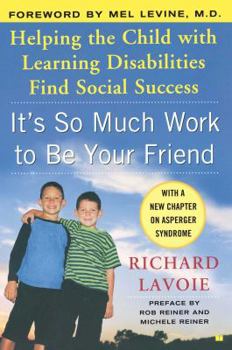It's So Much Work to Be Your Friend: Helping the Child with Learning Disabilities Find Social Success
Select Format
Select Condition 
Book Overview
Answers the most intense need of parents, teachers, and caregivers of learning disabled children -- or anyone who knows a child who needs a friend. ADHD - Anxiety - Nonverbal - Communication - Disorders - Visual/Spatial - Disorders - Executive Functioning Difficulties As any parent, teacher, coach, or caregiver of a learning disabled child knows, every learning disability has a social component. The ADD child constantly...
Format:Paperback
Language:English
ISBN:0743254651
ISBN13:9780743254656
Release Date:October 2006
Publisher:Atria Books
Length:448 Pages
Weight:1.42 lbs.
Dimensions:1.3" x 6.1" x 9.1"
Customer Reviews
5 ratings
Another hit from Rick LaVoie!
Published by Thriftbooks.com User , 17 years ago
I bought this book at the recommendation of my child's pediatric psychologist- it is a great help for parents of kids with learning disabilities and other challenges. I am familiar with Rick LaVoie from his other works and his incredible video series called "Fat City", in which he shows parents and teachers just what it is like to walk a mile in the shoes of the kids who deal with these challenges daily. I would highly recoomend both this book and the video series to anyone whose child is having trouble with social skills and/or facing a learning disability.
From a parent!
Published by Thriftbooks.com User , 18 years ago
This book is what I've been looking for: a book that teaches you HOW to teach social skills and organization skills for kids that just don't pick it up from interactions in everyday life. It's made a big difference in our everyday family and school life for my 2 ADHD/LD kids. My thanks to Rick Lavoie!
Read this book!
Published by Thriftbooks.com User , 18 years ago
Writing as someone who has lived with learning disabilities for nearly 50 years now, I cannot say strongly enough that I sincerely wish all of my teachers and parents had read this book. I will go a little further than that---I wish the pastoral counselor, psychologist, and psychiatrists that I have dealt with as an adult would read this book. This book brought back memory after memory of times that I have been misunderstood (and rejected) by those around me, and also times that I have greatly misunderstood social and job-related incidents (and acted inappropriately as a result). Some of the long-lasting psychological damage that I have had as a result could have been alieviated if only those around me had been aware of the difficulties that I was having (and continue to have). Notice that I did not say that the misunderstandings and social errors I make would have stopped. I don't think they would have. The book does not offer any cure-alls. Its biggest contribution is to increase the understanding of the social ramifications of learning disabilities. I have found that very few normal people have any understanding of this at all; and their response can be quite damaging.
Extremely Useful
Published by Thriftbooks.com User , 19 years ago
My son is not ADHD or LD, but he does have problems with social situations, organizational skills, short attention span, etc. This book addresses a lot of those things. A good portion of the book does not apply to my son because academically he is ahead of his peers and this book assumes that kids with social deficiencies also suffer academically. There are several chapters devoted to specific LDs which I skipped. This book helped me to be more understanding of children with attention problems because there are neurological reasons that make it very difficult for them to make socially acceptable decisions and remain focused on tasks. In the beginning there is a long list of behaviors that these children have and so many of them described my son. One part that I found very useful was the part in the introduction that explains why punishment does not correct poor behavior patterns. It will stop it for that episode, but not have lasting results. Also you should not say, for example, "If you behave in the restaurant then you can get dessert." Not getting dessert would be punishment. The child will be resentful and probably act the same way at the next restaurant. You should explain the expectation beforehand and then if the child behaves you would say, "You have been so good that I think you deserve some dessert." The child will feel a since of accomplishment which leads to them wanting to behave better. Also in the introduction is a 5 step approach of how to analyze with your child a social problem he encountered to help him figure out on his own what he did wrong and what he should have done. Another part that was extremely useful was the chapter on having friends over for visits and house "rules" you get your child in the habit of following so your child becomes a good host. All in all this is one of the best books I have read on helping children cope with attention and social problems.
Fills a huge void!
Published by Thriftbooks.com User , 19 years ago
Although there is often a social gap between children with disabilities and their peers, Lavoie thankfully gives parents the necessary skills to remedy this. This book is also important to parents of children with physical disabilities, parents who are wrestling with the importance of teaching eye contact, body language, modulated voice volume, and cleaner eating habits to their non-LD, but spastic child. Lavoie provides such a kind way of encouraging success! Fantastic book!





